Related Research Articles

Gaius Plinius Secundus, called Pliny the Elder, was a Roman author, naturalist, natural philosopher, and naval and army commander of the early Roman Empire, and a friend of the emperor Vespasian. He wrote the encyclopedic Naturalis Historia, which became an editorial model for encyclopedias. He spent most of his spare time studying, writing, and investigating natural and geographic phenomena in the field.

The phoenix is an immortal bird that cyclically regenerates or is otherwise born again. While it is part of Greek mythology, it has analogs in many cultures such as Egyptian and Persian. Associated with the sun, a phoenix obtains new life by rising from the ashes of its predecessor. Some legends say it dies in a show of flames and combustion, others that it simply dies and decomposes before being born again. In the Motif-Index of Folk-Literature, a tool used by folklorists, the phoenix is classified as motif B32.
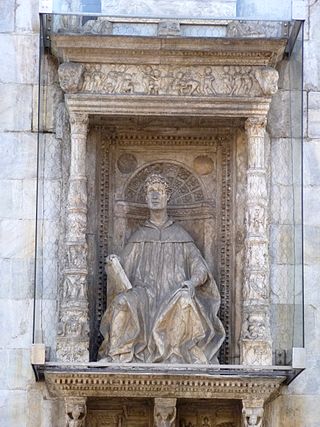
Gaius Plinius Caecilius Secundus, born Gaius Caecilius or Gaius Caecilius Cilo, better known as Pliny the Younger, was a lawyer, author, and magistrate of Ancient Rome. Pliny's uncle, Pliny the Elder, helped raise and educate him.
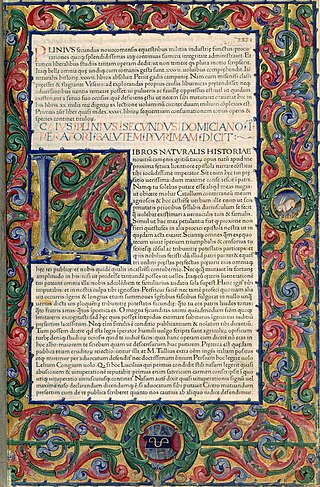
The Natural History is a Latin work by Pliny the Elder. The largest single work to have survived from the Roman Empire to the modern day, the Natural History compiles information gleaned from other ancient authors. Despite the work's title, its subject area is not limited to what is today understood by natural history; Pliny himself defines his scope as "the natural world, or life". It is encyclopedic in scope, but its structure is not like that of a modern encyclopedia. It is the only work by Pliny to have survived, and the last that he published. He published the first 10 books in AD 77, but had not made a final revision of the remainder at the time of his death during the AD 79 eruption of Vesuvius. The rest was published posthumously by Pliny's nephew, Pliny the Younger.
Aegle is the name of several different figures in Greek mythology:
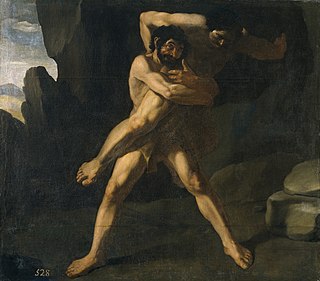
Antaeus, known to the Berbers as Anti, was a figure in Berber and Greek mythology. He was famed for his defeat by Heracles as part of the Labours of Hercules.
The name Cydippe is attributed to four individuals in Greek mythology.
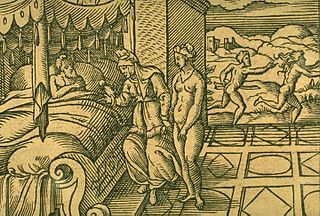
In Greek mythology, Cinyras was a famous hero and king of Cyprus. Accounts vary significantly as to his genealogy and provide a variety of stories concerning him; in many sources he is associated with the cult of Aphrodite on Cyprus, and Adonis, a consort of Aphrodite, is mentioned as his son. Some scholars have proposed a connection with the minor Ugaritic deity Kinnaru, the god of the lyre. The city Cinyreia on Cyprus was believed to have taken its name from Cinyras. According to Strabo, he had previously ruled in the city of Byblos in Phoenicia.

In Greek mythology, the Heliades also called Phaethontides were the daughters of Helios and Clymene, an Oceanid nymph.
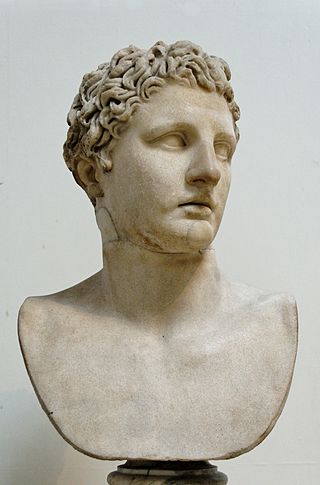
In Greek mythology, Meleager was a hero venerated in his temenos at Calydon in Aetolia. He was already famed as the host of the Calydonian boar hunt in the epic tradition that was reworked by Homer. Meleager is also mentioned as one of the Argonauts.
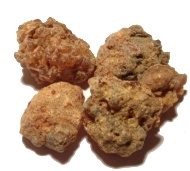
Myrrh is a gum-resin extracted from a few small, thorny tree species of the Commiphora genus, belonging to the Burseraceae family. Myrrh resin has been used throughout history in medicine, perfumery, and incenses. Myrrh mixed with posca or wine was widely used in many ancient cultures to produce pleasurable feelings and as an anti-inflammatory and analgesic.

A table of contents, usually headed simply Contents and abbreviated informally as TOC, is a list, usually found on a page before the start of a written work, of its chapter or section titles or brief descriptions with their commencing page numbers.

The gens Fabia was one of the most ancient patrician families at ancient Rome. The gens played a prominent part in history soon after the establishment of the Republic, and three brothers were invested with seven successive consulships, from 485 to 479 BC, thereby cementing the high repute of the family. Overall, the Fabii received 45 consulships during the Republic. The house derived its greatest lustre from the patriotic courage and tragic fate of the 306 Fabii in the Battle of the Cremera, 477 BC. But the Fabii were not distinguished as warriors alone; several members of the gens were also important in the history of Roman literature and the arts.
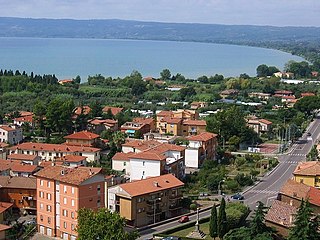
Volsinii or Vulsinii, is the name of two ancient cities of Etruria, one situated on the shore of Lacus Volsiniensis, and the other on the Via Clodia, between Clusium (Chiusi) and Forum Cassii (Vetralla). The latter was Etruscan and was destroyed by the Romans in 264 BC following an attempted revolt by its slaves, while the former was founded by the Romans using the remainder of the Etruscan population rescued from the razed city.
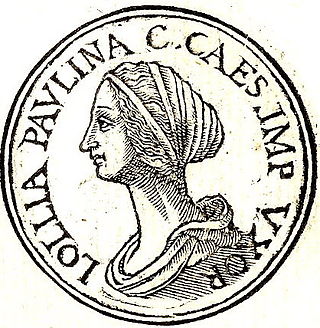
Lollia Paulina was a Roman empress for six months in 38 as the third wife of the Roman emperor Caligula.

Bdellium is a semi-transparent oleo-gum resin extracted from Commiphora wightii plants of India, and from Commiphora africana trees growing in sub-saharan Africa. According to Pliny the best quality came from Bactria. Other named sources for the resin are India, Arabia, Media, and Babylon.
Alban wine is a notable wine of Ancient Rome that was grown in the Colli Albani region, 20 kilometres (12 mi) Southeast of Rome, at the foot of Mt. Albus. The area is now occupied by the modern day papal residence of Castelgandolfo. The land was praised by Columella: "For there is no doubt that, of all the vines that the earth sustains, those of the Massic, Surrentine, Alban, and Caecuban lands hold first place in the excellence of their wine".
Metrodorus of Scepsis, from the town of Scepsis in ancient Mysia, was a friend of Mithridates VI of Pontus and celebrated in antiquity for the excellence of his memory. He may be the same Metrodorus who, according to the Elder Pliny, in consequence of his hostility to the Romans, was surnamed the "Rome-hater" ("Misoromæus"). Information on Metrodorus is very scarce.

Ceto is a primordial sea goddess in Greek mythology, the daughter of Pontus and his mother, Gaia. As a mythological figure, she is considered to be one of the most ancient deities, and bore a host of monstrous children fathered by Phorcys, another child of Gaia and Pontus. The small Solar System body 65489 Ceto was named after her, and its satellite after Phorcys.

The Epistulae are a series of personal missives by Pliny the Younger directed to his friends and associates. These Latin letters are a unique testimony of Roman administrative history and everyday life in the 1st century. The style is very different from that in the Panegyricus, and some commentators maintain that Pliny initiated a new genre: the letter written for publication. The genre of the letter collection offers a different type of record than the more usual history; one that dispenses with objectivity but is no less valuable for it. Especially noteworthy among the letters are two in which he describes the eruption of Mount Vesuvius in 79 during which his uncle Pliny the Elder died, and one in which he asks the Emperor for instructions regarding official policy concerning Christians.
References
- ↑ Epistulae ad Lucilium, 89, 7. hospes resiste et sophian Dossenni lege.